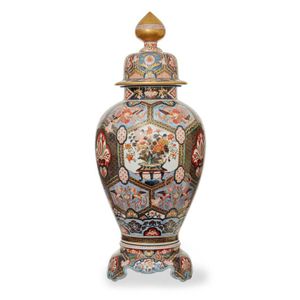Japanese Imari Polychrome Enamel Covered Vase, 77 cm
You must be a subscriber, and be logged in to view price and dealer details.
Subscribe Now to view actual auction price for this item
When you subscribe, you have the option of setting the currency in which to display prices to $Au, $US, $NZ or Stg.
- Cartouche - An ornamental panel in the form of of a shield, oval or rectangular scroll with curling edges. It may be carved into the back of a chair or the top of a sideboard, or present on a piece of silver or jewellery, and contain the initials of the original owner, heraldic symbols, or some other inscription, such as the details of a presentation.
In ceramics the term defines the central area of a vase or similar with a decorative border in one of the shapes above, into which a decorative scene or figures have been painted. - Finial - An architectural decoration, found on the upper parts of of an object. On furniture they are usually found on pediments, canopies and shelf supports. On smaller ceramic or silver items, such as spoons, they may decorate the top of the item itself, or the lid or cover where they provide a useful handle for removal.
Finials have a variety of shapes and forms. They may be urn-shaped, baluster shaped round or spiral, but usually taper into an upper point. Many real life shapes may also be used as finials, such as pineapples, berries, pinecones, buds, lotus and acorns. Sometimes animals such as a lion are depicted, or fish and dolphins. - Polychrome - Made or finished in many colours. For furniture, it is used to indicated a painted finish.
- Victorian Period - The Victorian period of furniture and decorative arts design covers the reign of Queen Victoria from 1837 to 1901. There was not one dominant style of furniture in the Victorian period. Designers used and modified many historical styles such as Gothic, Tudor, Elizabethan, English Rococo, Neoclassical and others, although use of some styles, such as English Rococo and Gothic tended to dominate the furniture manufacture of the period.
The Victorian period was preceded by the Regency and William IV periods, and followed by the Edwardian period, named for Edward VII (1841 ? 1910) who was King of the United Kingdom and the British Dominions and Emperor of India for the brief period from 1901 until his death in 1910. - Tortoiseshell - Tortoiseshell is a translucent material that comes from the horny carapace of a certain types of turtles, including the hawksbill turtle. It is often therefore mounted on a colour underground - often red - or inlaid with gold or silver thread, as seen in Boulle furniture.
The texture and colour nuances of the material are extremely important. Heated tortoiseshell can easily be formed into various shapes. Like other natural materials, tortoiseshell becomes more beautiful with use. In a time before plastic, tortoiseshell was widely used for small objects such as combs and powder compacts.
In 1973, the trade of tortoiseshell worldwide was banned under CITES (The Convention on International Trade in Endangered Species). Prior to importing or exporting items containing tortoiseshell a CITES permit must be obtained. Tortoiseshell items cannot be traded on Ebay.
"Faux tortoiseshell", another case of man initiating nature, is made from old-style plastics such as celluloid and cellulos and is coloured with red, yellow and brown spots to imitate the genuine article. It is commonly used in glasses frames, musical instruments and costume jewellery.
This item has been included into following indexes:
- Japanese ceramics, styles and decoration - Imari, vases and urns, lidded 41
-
Satsuma (Japan), item type
- other items 2,099
- vases 1,419
Visually similar items

A Japanese Imari covered vase, gilt and polychrome Enamels 19th/20th century, large and impressive Imari covered vase of baluster form with very fine polychrome enamel work, with background of tortoise shell and traditional wave design, the main cartouche

A Chinese Republic period vase and cover. Brightly painted with mythical creatures and warriors. 46 cm high.

A Satsuma earthenware vase and cover, ovoid shape, raised on three elephant head feet, the cover surmounted by a shishi finial, the body decorated with three fan shaped panels painted with flowers, figures and landscapes, on a brocade patterned ground with

A signed Satsuma vase, Meiji period, later 19th century, with maker's mark for Hododa, the baluster vase with a trumpet neck, waisted foot and lion's head gilt handles, decorated in a predominantly black, ox blood and gilt palette with Kannon and accompany
